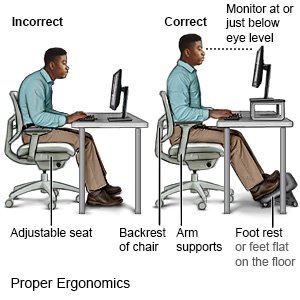Neck Pain
Medically reviewed by Drugs.com. Last updated on Aug 4, 2025.
You may have sudden neck pain that increases quickly. You may instead feel pain build slowly over time. Neck pain may go away in a few days or weeks, or it may continue for months. The pain may come and go, or be worse with certain movements. The pain may be only in your neck, or it may move to your arms, back, or shoulders. You may also have pain that starts in another body area and moves to your neck. Some types of neck pain are permanent.
 |
DISCHARGE INSTRUCTIONS:
Return to the emergency department if:
- You have an injury that causes neck pain and shooting pain down your arms or legs.
- Your neck pain suddenly becomes severe.
- You have neck pain along with numbness, tingling, or weakness in your arms or legs.
- You have a stiff neck, a headache, and a fever.
Contact your healthcare provider if:
- You have new or worsening symptoms.
- Your symptoms continue even after treatment.
- You have questions or concerns about your condition or care.
Medicines:
You may need any of the following:
- NSAIDs , such as ibuprofen, help decrease swelling, pain, and fever. This medicine is available without a doctor's order. Ask your healthcare provider which medicine to take and how often to take it. Follow directions. NSAIDs can cause stomach bleeding or kidney problems if not taken correctly. If you take blood thinner medicine, always ask if NSAIDs are safe for you.
- Acetaminophen helps decrease pain and fever. Ask your healthcare provider how much to take and how often to take it. Follow directions. Acetaminophen can cause liver damage if not taken correctly.
- Steroid medicine may be used to reduce inflammation. This can help relieve pain caused by swelling.
- Take your medicine as directed. Contact your healthcare provider if you think your medicine is not helping or if you have side effects. Tell your provider if you are allergic to any medicine. Keep a list of the medicines, vitamins, and herbs you take. Include the amounts, and when and why you take them. Bring the list or the pill bottles to follow-up visits. Carry your medicine list with you in case of an emergency.
Manage or prevent neck pain:
- Rest your neck as directed. Do not make sudden movements, such as turning your head quickly. Your healthcare provider may recommend you wear a cervical collar for a short time. The collar will prevent you from moving your head. This will give your neck time to heal if an injury is causing your neck pain. Ask your provider when you can return to sports or other normal daily activities.
- Apply heat as directed. Heat helps relieve pain and swelling. Use a heat wrap, or soak a small towel in warm water. Wring out the extra water. Apply the heat wrap or towel for 20 minutes every hour, or as directed.
- Apply ice as directed. Ice helps relieve pain and swelling, and can help prevent tissue damage. Use an ice pack, or put ice in a bag. Cover the ice pack or back with a towel before you apply it to your neck. Apply the ice pack or ice for 15 minutes every hour, or as directed. Your provider can tell you how often to apply ice.
- Do neck exercises as directed. Neck exercises help strengthen the muscles and increase range of motion. Your provider will tell you which exercises are right for you. The provider may give you instructions or may recommend that you work with a physical therapist. Your provider or therapist can make sure you are doing the exercises correctly.
- Maintain good posture. Try to keep your head and shoulders lifted when you sit. If you work in front of a computer, make sure the monitor is at the right level. You should not need to look up down to see the screen. You should also not have to lean forward to be able to read what is on the screen. Make sure your keyboard, mouse, and other computer items are placed where you do not have to extend your shoulder to reach them. Get up often if you work in front of a computer or sit for long periods of time. Stretch or walk around to keep your neck muscles loose.

Treatment options
The following list of medications are related to or used in the treatment of this condition.
Follow up with your healthcare provider as directed:
Your healthcare provider may refer you to a specialist if your pain does not get better with treatment. Write down your questions so you remember to ask them during your visits.
© Copyright Merative 2025 Information is for End User's use only and may not be sold, redistributed or otherwise used for commercial purposes.
The above information is an educational aid only. It is not intended as medical advice for individual conditions or treatments. Talk to your doctor, nurse or pharmacist before following any medical regimen to see if it is safe and effective for you.
Learn more about Neck Pain
- Pain Management: Types of Pain and Treatment Options
- Top 9 Things You Must Know About Naproxen
- Tramadol - Top 8 Things You Need to Know
Treatment options
Care guides
Further information
Always consult your healthcare provider to ensure the information displayed on this page applies to your personal circumstances.
